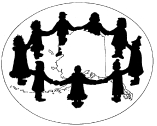
AKABE
Events
Mailing Address:
Karen Waters, 50600 Claire Drive, #10
Kenai, AK 99611

37th BMEEC Spring 2011
The date, place & time for the 37th BMEEC has yet to be determined, but it is expected to occur some time in April of 2011.
Please visit the AKABE wiki for the most up to date information. If you are an AKABE member, please join our social networkAKABE Online. All of our sites are participatory and we encourage you to help us fulfill AKABE's goals for language & cultural diversity.Whether it will become a theme for the 37th BMEEC or not, one of our aims this year is to promote understanding of the vital role scaffolding plays in effective language acquisition programs.
As it was for the 2010 BMEEC, it is expected that BMEEC information and registration will be found online at:
BMEEC.net
NABE 2011 40th Annual Conference
Celebrating 40 Years of Educational Excellence in Reforming, Renewing,
and Achieving Equity through Bilingual Education and Biliteracy for All
Ernest N. Morial Convetion Center
New Orleans, Louisiana February 16-19, 2011
www.nabe.org
NABE 2011 Conference Call for Presenters
TESOL Conference 2011
Examining the "E" in TESOL
Ernest N. Morial Convention Center
New Orleans, Louisiana March 17-19, 2011
www.tesol.org
TESOL 2011 Call for ProposalsConvention 2011 Vision Statement
In today’s world where English has become the primary language of business, education, science and technology, it has evolved and changed to meet these and other global and local or glocal needs. What implications does this glocalization of English have for TESOL and for you? This year, as we continue to re-imagine TESOL, we invite you to consider what E means in your contexts and to examine what E we teach, for what purposes, how, to whom, and with what results. We invite you to examine the E in TESOL in a context where e-communication, easy travel, and e-pedagogy are changing the English language and effecting current approaches to the learning and teaching of the language; where these changes are influencing our experience, expertise, and evaluation of the field; and where issues of equity, excellence, and effectiveness have taken center stage. In such a context, it is essential for us to understand what it is that we teach and how that understanding can influence our actions, theories, and practices.